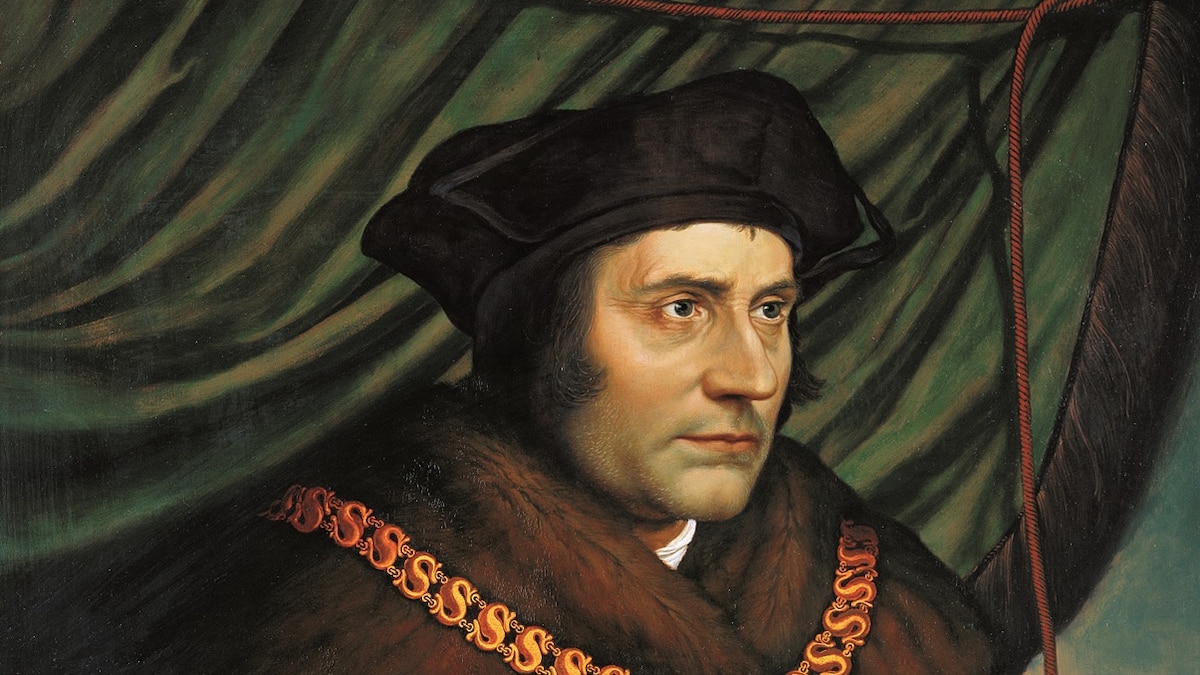In a scene from Robert Bolt’s wonderful play A Man for All Seasons, Thomas More is incarcerated in the Tower of London because he refuses to take an oath acknowledging the supremacy of King Henry VIII over all foreign leaders, including the Pope. But More has already taken an oath pledging his loyalty to the Church.
Margaret (Meg), More’s daughter, sees the gross injustice of the king’s insistence upon the oath and is searching for any means that might free her father from jail and save his life. She visits him in his cell, and the two have the following conversation:
Margaret: “God more regards the thoughts of the heart than the words of the mouth.” Or so you have always told me.
More: Yes.
Margaret: Then say the words of the oath and in your heart think otherwise.
More: What is an oath then but words we say to God?
Margaret: That’s very neat.
More: Do you mean it isn’t true?
Margaret: No, it’s true.
More: Then it’s a poor argument to call it “neat,” Meg. When a man takes an oath, Meg, he’s holding his own self in his own hands. Like water. (He cups his hands) And if he opens his fingers then—he needn’t hope to find himself again. Some men aren’t capable of this, but I’d be loathe to think your father one of them.
Margaret: In any State that was half good, you would be raised up high, not here, for what you’ve already done. It’s not your fault the State’s three-quarters bad. Then if you elect to suffer for it, you elect yourself a hero.
More: . . . If we lived in a State where virtue was profitable, common sense would make us good, and greed would make us saintly. And we’d live like animals or angels in the happy land that needs no heroes. But since in fact we see the avarice, anger, envy, pride, sloth, lust and stupidity commonly profit far beyond humility, chastity, fortitude, justice and thought, and have to choose to be human at all . . . why then perhaps we must stand fast a little, even at the risk of being heroes.
More did “stand fast,” refused to take the oath, and was beheaded. It was a tragic ending for such a gifted man, but his actions eventually led to his canonization.
There was a time when most people took oaths seriously. Today many people look upon oaths as quaint relics from the past—interesting but not relevant. As a consequence, oaths, whether taken in a church setting or in a courtroom, are often tossed aside like yesterday’s newspaper. Dying to honor an oath? Not likely.
And that brings me to a situation in my own life that I find disturbing. One of my nephews was raised Catholic, and while in college, met his future bride. Even though she was Lutheran, they chose to be married in a Catholic church.
After about a year of marriage, they had a baby boy. He was baptized in the same church where the wedding took place, and I was honored to be a witness. So far, so good.
Years went by, and I didn’t have a lot of contact with my nephew and his family, although I would see them occasionally at holiday gatherings. During those years I thought his son was being raised in the Catholic faith. However, a few weeks ago my nephew admitted to me that he was not practicing the Faith anymore. I had little time to talk with him at the time, but I urged him not to give up on the Church.
A few weeks later I received an invitation to attend his son’s confirmation–in a Lutheran church. And it is this which brings me to the subject of oaths.
Both my nephew and his wife vowed (took an oath) to raise their son Catholic, and now they have clearly broken that vow. What’s worse is that they are asking me to affirm their decision by attending the ceremony. Of course, that is not an option for me.
Now my nephew and his wife are not evil people, and I believe that they invited me with all good intentions. I’m sure it never crossed their minds that their decision would put me in an untenable position.
Their decision to break their vow leads me to consider the following questions:
- Do they understand that their Baptismal vow is not between them and their families but between them and God?
- Do they understand that a vow places many duties upon them, duties that cannot be cast aside willy-nilly?
- Do they know that an oath subjects them to the will of God?
- Do they know that Baptism and all the other sacraments are, according to theologian Scott Hahn, “sacred oaths that sealed, renewed, and signified membership in a covenant family”?
- Do they know that when they invoked the name of God as they made the vow that they were swearing by God’s name and on his honor, not their own?
- Do they know that a false oath calls on God to be witness to a lie (CCC n. 2151)?
- Did it ever occur to them that once one breaks a vow, breaking the next one becomes easier?
I’m inclined to give my nephew and his wife the benefit of the doubt. It is possible that they never considered the significance of making a vow and the ramifications of casting it aside. After all, they were very young at the time of their Baptismal vow, and my guess is that their priest spent little or no time discussing the importance of a vow. I would rather attribute their actions to ignorance rather than willful defiance. But they have committed a serious sin, and their son is being denied his rightful spiritual heritage. I will pray for them.






And the breaking of vows is happening all too often today. I agree that most of the blame goes to those who didn’t teach them the seriousness of vows and those priests who didn’t talk abt this more often at the Sunday homily ….
The non-Catholic partner does not promise to raise their child in the Catholic Faith, since the Catholic parent is no longer a practising Catholic; it seems unreasonable to expect the Lutheran parent to raise the child in the Catholic Church.
Mr. Mesley,
You are quite right that the non-Catholic parent need not promise to raise the child in the Catholic faith. However, the Catholic parent, prior to the wedding, must promise to do everything in his power to have the child baptized and educated as a Catholic. If both parents request the child to be baptized in the Catholic faith, the non-Catholic parent must give permission for the child to be raised in the Catholic faith. My point in the article is that both spouses have disregarded a sacred oath. There is no question that my nephew bears the greater burden here.